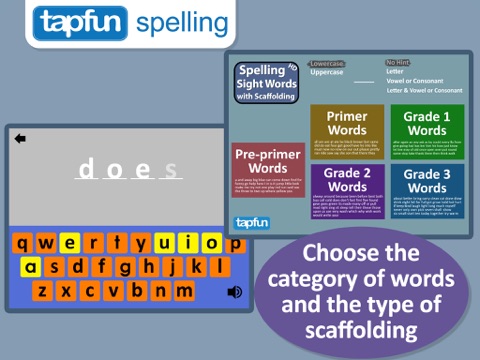
Spelling Sight Words for Speech Language Pathologists Pro
Designed for Speech Language Pathologists who are working with struggling spellers, this app is used in the classroom and home. This app includes all 220 of the Dolch Sight Words including the following levels: Pre-primer, Primer, Grade 1, Grade 2, and Grade 3.
A variety of scaffolding support has been built in including the following:
- 3 hint modes: letter, vowel or consonant, and vowel or consonant and letter
- normal and slow pronunciation for each word (tap on the sound button to hear the slow pronunciation)
- uppercase and lowercase options
This app uses a QWERTY keyboard layout. As a result of the built-in scaffolding, this app can be used for different levels of spellers. The variety of scaffolding support make this spelling app stand out. Great for one-on-one tutoring and in class to focus on isolated word groups.
The reward at the end of each level is a short optional balloon popping game. Pop as many balloons as you can in 30 seconds to see who has the fastest fingers.
Are you interested in joining our app testers group and influencing our future apps? Join us at tapfun.com and learn about our methodology and approach.
About Tapfun
Tapfun works with educators to produce educational apps for elementary school children. Our apps are designed to complement and supplement school curricula. Our latest app “Math Word Problems - Addition and Subtraction for Kindergarten and First Grade” was authored & developed by experienced educator Anne Gardner (Nationally Board Certified in the U.S. for literacy).
More About the Dolch Sight Words (High Frequency Words):
The Dolch Sight Words are the foundation of reading! The Dolch sight word list (also called "High Frequency" words) contains 220 "service words" that have to be easily recognized in order to achieve reading fluency in the English language. There are five groups of words: Pre-primer, Primer, Grade 1, Grade 2, Grade 3.
Sight word acquisition is a critical building block for any childs ability to read. For example, once he or she can read all of the words on Dolch’s lists, they will have access to 75% of what is printed in almost any piece of children’s literature. The more one-on-one time a child has learning and practicing sight words with an adult, the greater his chances to integrating them into his long-term memory.



